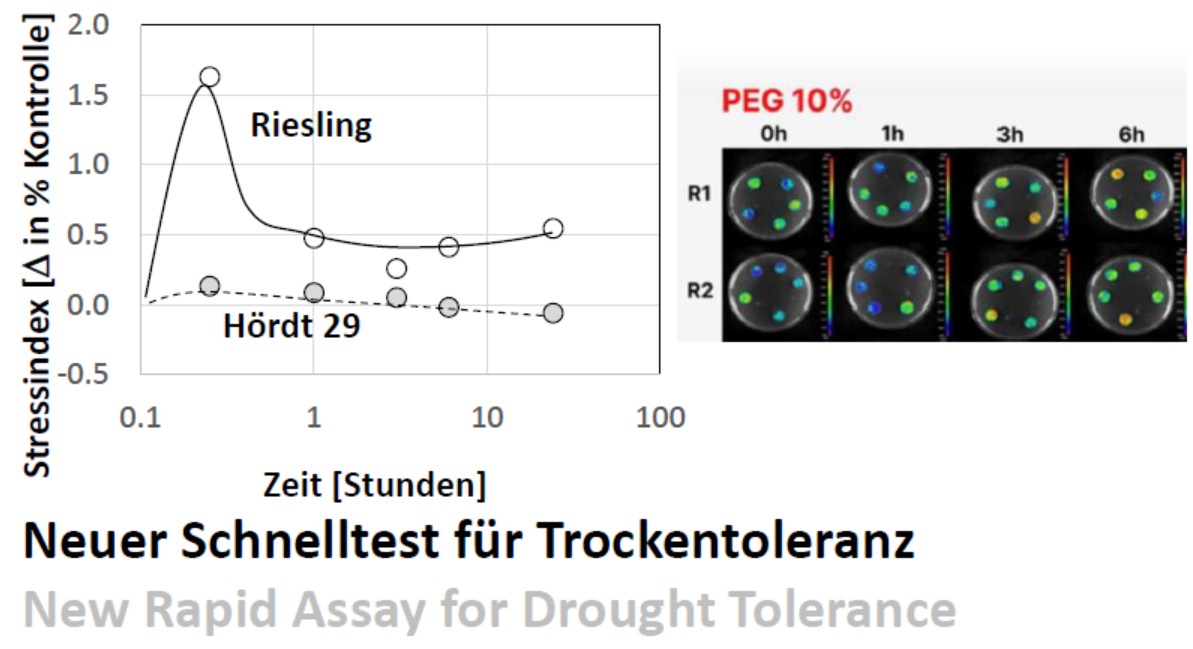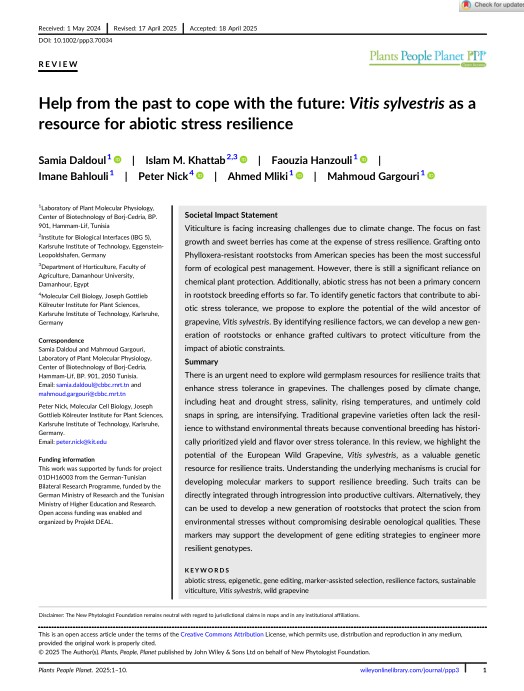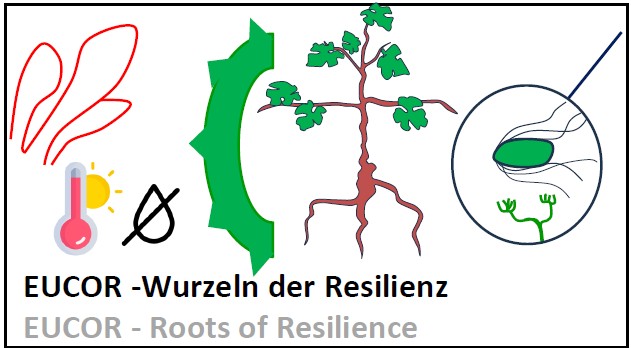Project closure meeting at FibL
On October 25, 2025 all partners met for the closure meeting at FibL in Frick. After three years the Interreg funding for Kliwiresse ends. The numerous connections and intense cooperations that have grown over this time, will be pursued anyway. The meeting showed clearly that many methods to assess climate resilience could be newly developed and validated and that many factes of grapevine stress resilience could be uncovered. This includes new genes that can be used for breeding, or new markers that swiftly and reliably can predict the heat tolerance of grape and rootstock varieties. During the coming months, several scientific publications will be generated. A public closure is planned, together with the sister project Wivitis, for next spring in Basel. Further, the partners decided to concur once a year, together with the players in the previous Interreg projects Bacchus, Vitifutur, and Dialogprotec, to synchronise their research for the sake of sustainable viticulture.
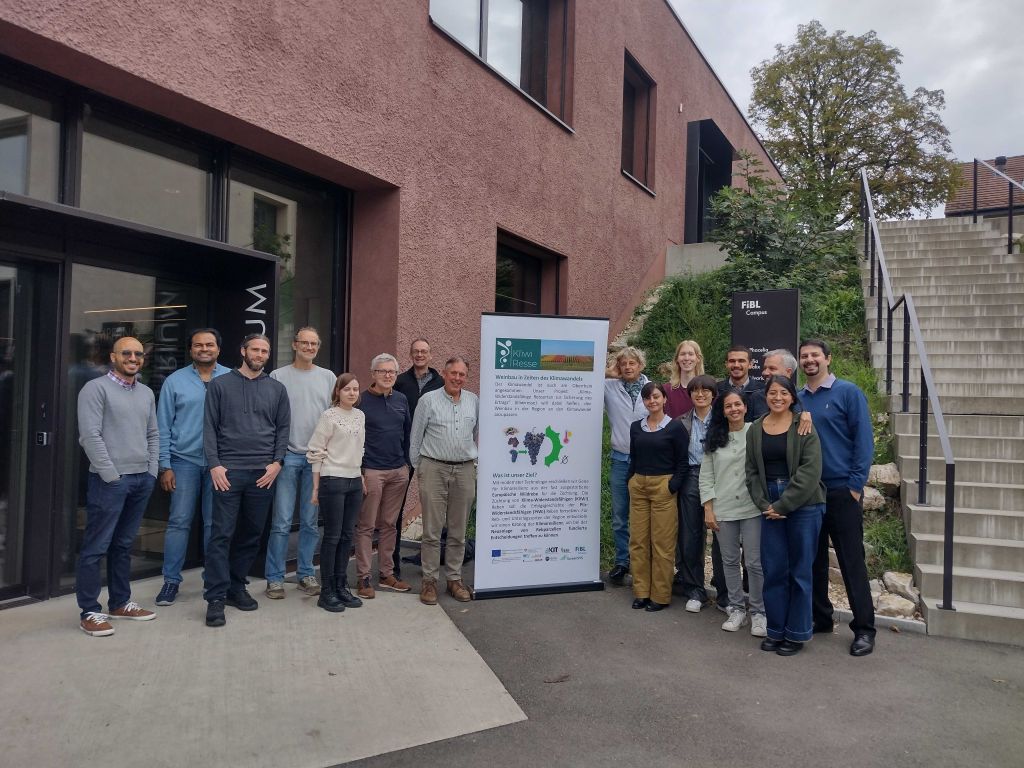
Climate Change has reached viticulture
- Results of a poll with the winegrowers of our region
Kliwiresse addresses also dialogue with the real world - in both direction. A current poll with the winegrowers of our region demonstrates crisp and clear that Climate Change has already reached viticulture long ago. Many winegrowers report on problems with sun burn and Grapevine Trunk Diseases ("Esca & Co"), artificial irrigation is meanwhile common in many vineyards. However, there are significant differences in the susceptibility of different varieties. The details of the poll can be found here (D/F):
Umfrage_2025_07_30.pdf
New rapid assay for drought tolerance developed
At KIT-JKIP a new rapid assay was developed to determine the drought tolerance of grapevine. The assay is based on the stress-induced bioluminescence of chlorophyll that can be measured by a so-called NightShade device (kindly provided by Bechthold Co.). For the test round discs are cut out from the leaf and placed on agar that has been doped with 10% of the osmoticum polyethylenglycol (PEG). This will extract water from the cells, exactly as it happens during a drought episode in summer. Now, one can measure, how good the chlorophyll remains buffered against this stress. Again, Riesling performs poorly, while the wild grapevine Hördt 29 very efficiently copes with drought stress. Using this test, numerous varieties as well as wild accessions from our collection will be screened.
How the European Wild Grapevine can help to render viticulture climate-resilient
A central mission of Kliwiresse is valorising the European Wild Grapevien, the ancestor for our domesticated Grapevine, for breeding new varieties with superior climate resilience. In cooperation with partners from Tunesia members of partner KIT-JKIP were able to publish a review in the international journal Plants, People, Planet explaining, why the European Wild Grapevine harbours genes for climate resilience and how these can be utilised:
Daldoul S, Khattab I, Bahlouli I, Nick P, Mliki A, Gargouri M (2025) Help from the past to cope with the future: Vitis sylvestris as resource for climate resilience. Plants, People, Planet doi 10.1002/ppp3.70034 - pdf
Fifth Kliwiresse Project Meeting in Karlsruhe
The fifth project meeting was hold April 16, 2025 at the Joseph Gottlieb Kölreuter Institute for Plant Sciences in Karlsruhe. All project partners attended and presented their newest results. Also our sister project Wivitis was represented. Following intense scientific discussions, the experimental and exchange activities for the current year were synchronised, as well as further activities in the field of knowledge transfer. In total, most project outputs have already been achieved.
The next scientific project meeting will take place in autumn at FibL. The official final symposium is planned for early next year, probably as part of an annual meeting of a winegrower association to carry the project results into the broader public. Following presentations, discussion, and planing, there was a practical part, where the results of a field study by FibL on the effect of the plant fortification product FertiRoc on wine quality was assessed using sensoric methods.
Joseph Gottlieb Kölreuter Award for Paula Venzke
Since 2021, the association Friends of the Botanic Garden at the KIT, announces the Joseph Gottlieb Kölreuter Award for Sustainability. It is dedicated for theses in the field of plant sciences that contribute to sustainability in agriculture, or nature and environmental conservation. This year it was Paula Venzke, who did her master thesis with us an with our partners at the IBMP in Strasbourg. Topic was climate change in viticulture. How can we cope the challenge of progressively hot summers by breeding novel KliWi varieties (for Klima-Widerstandsfähig, climate resilient)? How can we determine the climate resilience of current varieties on a scientific base? Paula Venzke conducted controlled heat-stress experiments at the JKIP Experimental Station and developed non-invasive techniques to monitor the physiological responses of grapevine. She could demonstrate that the popular variety Riesling has to buffer heat stress by opening its stomata, thus, losing a lot of water. In contrast, the wild grapevine Hördt 29 originating from the alluvial forests of the Old Rhine can tolerate higher leaf temperatures, such that it can economise the use of water. This work led to new insights and new methods to evaluate heat tolerance on a scientific base, also an important contribution for our Interreg Upper Rhine projekt Kliwiresse. Congratulations!

Kliwiresse Partner Successful in EUCOR Call
EUCOR, the trinational assocation of Upper-Rhine universities (Karlsruhe, Strasbourg, Freiburg, Colmar-Mulhouse, Basel) launched a call for so-called Seed Money projects. Here, partner KIT-JKIP (Islam Khattab, Peter Nick) together with the University of Basel (Pascale Flury) and the Université Haute-Alsace (Julie Chong) was successful with the project Roots of Resilience. The project tries to render grapevine more resilient against climate-change born novel fungal diseases ("Esca & Co") through improved microbial communities in the rhizosphere. The project is based on results of Kliwiresse, but also previous Upper Rhine Interreg projects, especially Vitifutur and DialogProTec. However, the central reason for the success of the proposal was the cooperation cultivated over four Interreg Upper Rhine networks. The Seed Project in turn will feed into the planned sequel project Robin Root. Planned start is February 2025, running time is two years.
Kliwiresse Project Meeting at Partner ScreenSYS in Freiburg at 24.10.2024
The project partners assembled this time at ScreenSYS in Freiburg, all partners were attending. The meeting lastet for a day, where results from the closed vegetation period were presented, discussed and the experiments for the coming year were agreed and coordinated. After the presentation, the automised high-throughput microscopy platform was demonstrated, by which ScreenSYS screens chemical libraries with respect to their ability to induce embryogenesis. The next meeting is planned in the spring in Karlsruhe at partner KIT-JKIP.
Sequel project "Robin Root" in preparation
In frame of the new Interreg Upper Rhine call published in July 2024, we are currently working on a sequel project Robin Root, where several of the partners from Kliwiresse join with the State Institute of Viticulture and Oenology, the Université Haute Alsace, the INRA Colmar, the nursery Kiefer & Sester, and the Karlsruhe start-up Vertical Farm Tech. Also this project ventures to help viticulture adapt to climate change. Focus is on the root of the rootstock - its resilience will not only improved by breeding, but also by modulation of the root microbiome, as well as by stimulation through aeroponics.
The new project is rooted in the results from the previous Interreg projects BACCHUS, VITIFUTUR, DIALOGPROTEC and KLIWIRESSE and compiles the well established fruitful research cooperation of the partners in the region. Tentative start date is August 2025.
Kliwiresse project meeting at partner CRNS-IBMP
in Strasbourg May 14, 2024
This time, the partners were guests of the Institute de Biologie Moleculaire des Plantes in Strasbourg. All partners were present. During the one-day meeting, the outcome from the previous year, analysed over the winter, were presented and the plans for the ensuing vegetation period finalised, especially with respect to cooperative activities, such as exchange of materials, synchronisation of time schedules, experimental details and activities for knowledge transfer and publicity.
In addition, options for future research were explored, also considering a novel Interreg Upper Rhine project. After the meeting, the host demonstrated the metabolomics platform established at the IBMP that was already used for this project during the analysis of heat stress responses. The next meeting is foreseen in autumn, after the current experimental campaign, this time at partner ScreenSYS.
Project Microbes 4 Future at the KIT
Our work in DialogProTec demonstrated that the outbreak of the climate-dependend Esca-Syndrome depends on a perturbed chemical communication between grapevine and wood-colonising fungi. Although we found wild grapevines that can cope with Esca & Co, using them for breeding will be too slow to adapt viticulture to climate change. Our new project Microbes 4 Future, an interdisciplinary cooperation at the KIT searches for alternatives. As we humans host a gut microbiome that is crucial for our immunity, plants foster in their rhizosphere a plant microbiome. Can this help to sustain a healthy communication between grapevine and fungi even under the pressure of climate stress, and, thus, to prevent the outbreak of the Esca syndrome? Our lever is so called terra preta (biochar), which we add to the soil.
A large experiment under controlled conditions demonstrates that this mitigates the disease significantly, which is accompanied by a stronger activation of plant immunity genes. The microbiome is altered as well. Meanwhile we know microbes that correlate with Esca resilience – whether the are the cause of resilience, we do not know yet. If so, this would pave the way for a therapy against Esca.
Read more: https://www.jkip.kit.edu/botzell/2938.php
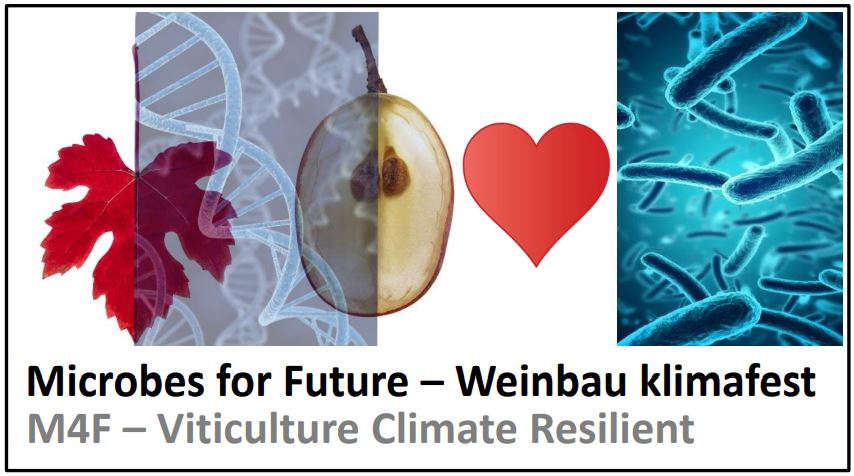
30.11.2023: Kliwiresse Project Meeting
This time, the project meeting took place at the Julius-Kühn-Institut (JKI) for Grapevine Breeding in Siebeldingen. Again, all partners were represented and showed the newest results from the experimental campaigns of this summer. Comparative heat-stress experiments for Riesling and the wild grapevine Hördt 29 by KIT and IBMP showed that first, both grapevines try to lower leaf temperature by opening their stomata and, thus reaching increased transpiration. However, while the wild grapevine can close its stomata again within one day, probably, because it can compensate the heat stress by the heat-shock proteins formed by then, Riesling still needs to keep its stomata open, which results in a higher loss of water. Also the sunburn experiments at the phenotyping platform of JKI show a good performance of this wild grapevien, as well as the stress experiments with automised microscopy at ScreenSYS. The markers for stress memory identified at the IBMP confirm that Hördt 29 can cope better with heat stress. The fact that quite diverse strategies and methods lead to the same picture, demonstrate that the project strategy to assess stress on very different system levels, has been successful. The next step is now to transfer the knowledge obtained in the laboratory to the vineyard where the conditions, differing from the experiment, are not under control. Here, FiBL Frick has assessed the effect of plant fortification compounds and also compared the performance of different PiWi-varieties. They find significant differences.
Since the conditions in the vineyard cannot be controlled, but only evaluated in retrospec, KIT has developed two novel approaches that will be used in the coming season on a broader scale. First, determination of stable carbon isotopes allows to assess, how often a given plant has to open or close the stomata during the summer. Here, more than 30 wild grapevinves and rootstock varieties were compared and found to differ considerably. Next year, this will be used to probe the rootstock collection at FiBL. Furthermore, a leaf-disc assay was developed that enables to screen a large number of varieties for their heat tolerance. The results show good match with the other tests used in the project. A result that is important for the wine industry is the good performance of Chardonnay in terms of heat stress. Possibly, this variety could replace in the next decades the very sensitive Riesling. The double haploidisation has been led to a standardised approach yielding already early embryonic stages. With the support of associated partner WBI a procedure could be established that allows to get on a regular base flowers in the necessary stage, such that the work can even go on during the winter months. For the vegetation period 2024 joint experiments between KIT, FiBL, IBMP and JKI were planned in detail and also the next step of knowledge transfer and public relations were synchronised.
07.07.2023: regular project meeting
At the regular project meeting of Kliwiresse at FiBL Frick the newest results were presented and exchange, synchronising the cooperation activities of the partner for the running vegetation period. For the double haploidisation ScreenSYS) a continuous supply with biological material (closed flowers in a specific stage) could be organised even through the winter season. The heat stress experiment at KIT will be supported by the analysis of metabolic signatures at IBMP. Here, Paula Venzke from the KIT will work for a few weeks at the IBMP. The Sunburn Phenotyping Platform at the JKI was presented. Here, in addition to the crossing populations with PiWi grapes at the JKI, the heat resistant wild grapevine Hördt 29 will be analyse. Later, the samples will be sent for hormonal metabolomics to the IBMP. Further, common studies of KIT, FiBL and JKI for the vegetation period 2024 were coordinated - they will address the impact of different rootstock varieties. Also additional steps in knowledge transfer and public relations were defined.
Event "Wine - Climate - together we will cope with this"
June 13, 14-17, the event "Wine - Climate - together we will cope with this" will take place at the
Weincampus Neustadt. After an introduction on the topic viticulture in times of climate change, there will be the opportunity to discuss, across borders about problems and their solutions. The event is free of charge.

